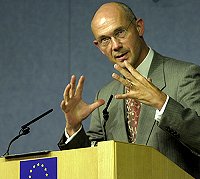 I have no idea whether it’s viable, or whether he would consider it, but I think I have – from a personal point of view – come up with a candidate I would actually like to see as President of the European Commission: Pascal Lamy.
I have no idea whether it’s viable, or whether he would consider it, but I think I have – from a personal point of view – come up with a candidate I would actually like to see as President of the European Commission: Pascal Lamy.
He has a background as an effective administrator, has an understated style, and knows how Brussels works. The fact that François Bayrou wanted him as French Prime Minister shows how he can have appeal across the political spectrum. He has a good grasp of English, was effective term as European Commissioner for Trade (1999-2004), and is currently Director General of the WTO – so he’s not a ‘put up the barriers’ protectionist. In fact his approach would not be typically French. He’s even an effective communicator and seems to have a sense of humour.
What speaks against him? Formally he’s a socialist, and the EPP would surely demand the Commission President position. He would be tougher on Member States that Barroso has felt able to be – would Member States want that? Plus he’ll be 62 years old next year, and hence 67 by the end of a term as Commission President – does he have the energy?








I agree that the principle of linking election results to the Commission President is crucial – is it completely inconceivable that the PES will “win” the 2009 Euro-elections?
However personally I also agree that Lamy would be a strong name.
But I think any British government would find him very difficult to accept. Firstly, he is French, which British public opinion would find very difficult to accept (and the current British government is not in a strong position to resist), and secondly his association with Delors in his phase as Commission President would surely make him simply unacceptable, specifically to certain influential parts of the British media, which I can see going all out to prevent him if he were seriously mooted.
Thanks, I stand corrected. But how to get that across to voters in a way that makes sense to them…hmm…
That’s why I like having you as a reader of my blog Ralf! I can always count on getting the legal references… 🙂
Jo,
Taking into account the elections to the European Parliament when proposing the candidate for president of the Commission is based on Article 17(7) of the Treaty on European Union (consolidated Lisbon Treaty version).
The principle is important enough, and it is one more reason for EU citizens to participate in the EP elections 2009 and onwards.
Yes, the principle is a step towards democratic accountability, even if huge numbers of citizens were lazy or immature enough to stay at home on polling day.
“Experienced, internationally respected, and above all French. But weren’t these the same criteria as Giscard for the Convention on the Future of Europe?”
Sorry, but Giscard was really over the hill – Lamy is not.
As for the EP-Commission link: it’s vital. If the future direction of the EU integration process was somehow linked to the results of the EP elections it might help to europeanize those elections a bit. It’s stated in the Treaty of Lisbon that the appointment of the Commission President must reflect the results of the EP elections…
Interesting idea.
Experienced, internationally respected, and above all French. But weren’t these the same criteria as Giscard for the Convention on the Future of Europe?
I’m not entirely clear why there’s a principle of taking EP election results into account in choosing the flavour of Commission President… votes for selecting representatives there are hardly representative of political views when turnout is considered on an EU-wide basis. Is it really any more democratic that governments supporting candidates of the same political hue as their majority party? 🙂
Jon,
An interesting name, but the principle to take the results of the EP elections into account is an important landmark for EU level democracy at its present toddler stage.
This would demand the European Socialists to launch him as their candidate ahead of the 2009 elections.